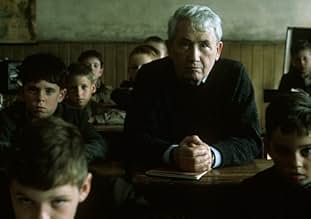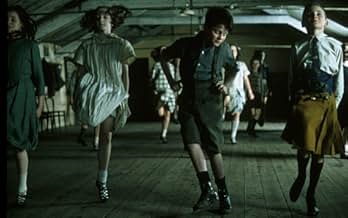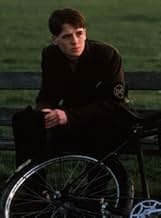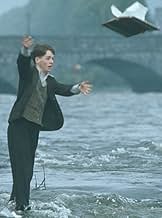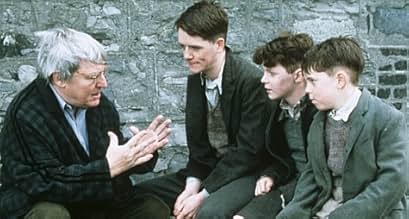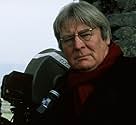An Irish Catholic family returns to 1930s Limerick after a child's death in America. The unemployed I.R.A. veteran father struggles with poverty, prejudice and alcoholism as the family endur... Read allAn Irish Catholic family returns to 1930s Limerick after a child's death in America. The unemployed I.R.A. veteran father struggles with poverty, prejudice and alcoholism as the family endures harsh slum conditions.An Irish Catholic family returns to 1930s Limerick after a child's death in America. The unemployed I.R.A. veteran father struggles with poverty, prejudice and alcoholism as the family endures harsh slum conditions.
- Director
- Writers
- Stars
- Nominated for 1 Oscar
- 5 wins & 12 nominations total
- Narrator
- (voice)
- Young Malachy
- (as Shane Murray Corcoran)
- Director
- Writers
- All cast & crew
- Production, box office & more at IMDbPro
Featured reviews
So, the book is better - especially how he indicts the Catholic Church for keeping his family in poverty - but the movie is passable. Alan Parker has maintained a pretty good track record.
But the 1930's in poor suburbs of New York in the Great Depression was hardly a friendly environment lurking behind the awesome sight of the lady with the torch in the harbour (a present of the French Government).
`Angela's Ashes' records those grim years for a poor family, based on hard autobiographical facts; but Frank McCourt's book better conveys that curiously Irish sense of fatalistic humour combined with that strangely abject Catholicism so pervasive in life of those times. The elements contrast and contradict themselves: the useless alcoholic father who must be respected because he is their father, though later he disappears, and the boy's (Frankie) obedient and supposedly devout sessions at the confessionary box, would seem to veer into mirth if it were not for the sinister underlying sociological aspects. And it is the classroom where much of this spoon-fed doctrinal interpretation obviates the ruthless imposition of supposedly `clean' ideology - whether Catholic or not.
Beautifully filmed in almost black and white, with more colour creeping in as the film progresses, undoubtedly Alan Parker has done a good job and has tried to remain faithful to the philosophical concepts of the book. Excellent Emily Watson and Robert Carlyle, but no less so the different youngsters used in the film as the children grew up, especially Michael Legge. Other secondary actors are all exemplary, well cast. The result is a film that has an authentic feel to it, such that having already read the book and seeing this film twice in no way diminishes the interest it suscitates. The music is a very different kind of John Williams to what we are accustomed, giving correct ambience to the story's unfolding.
Even though the film brought no surprises, I still thought it was fascinating because of the fantastic cinematography in here and the great job done by the actors. The muted colors in this film are beautiful and the lighting is superb. Then again, it's hard to go wrong with a nighttime streetlight-lit shot of cobblestone streets. The directing talents of Alan Parker were never more evident than here. He should do more movies.
The book, "Angela's Ashes," is a biography of McCourt and his extremely poor Irish family. All three boys who play McCourt at various times in his development are excellent here. The whole cast is excellent, for that matter, led by "Angela" (Emily Watson) and husband Malachy (Robert Caryle). Two sadder-looking faces, you never did see, and a more rainy, dreary town (Limerick) you never did see....so if you're looking a happy, uplifting story, pass this one by. However, if you want a film totally true to a great book, wonderfully photographed film and one acted well ....and with some unique humor to it, check this out.
I don't want to leave out the humor, the key ingredient in McCourt's otherwise- depressing days of growing up. Humor and dire poverty never went together so well as McCourt made it sound through his book and the filmmakers did through this movie.
This is a very pure, almost sterile, adaptation of the original memoir "Angela's Ashes" by Frank McCourt. It chronicles vignettes in the family history of the McCourt's, a poor Irish Catholic family struggling to survive in early 20th century Ireland. The film, like the book, is stark, painful, hopeful, powerful, and deftly accurate. More than a period piece, this film works as a dramatic rendering of social history.
Unlike the book, this film depicts Frank's childhood from a disembodied third person perspective, though it is liberally complemented by an effective voice-over narrative drawn almost directly from McCourt's own prose. Frank is the oldest of several siblings (many of whom never reach adulthood), in a family suffering from poverty, alcoholism, and persecution. Although the film has many positive messages, like the lives of the McCourt's, it's not an easy road. Those who wish to be simply entertained should probably not bother.
The performances are all exquisite. Kudos to the cast and the director for making them all look so great. Visually, the film is stunning for its starkness and powerful use of contrast. The pace is a little breathless at times, but, given the richness of the original work, this is appropriate.
All considered, this is a very worthy representation of the book. The only quibble I have stems from the very act of translating what was a very intensely personal, first-person memoir into a third-person medium like film, not from anything the production team did, or from the script and cast. It would likely have been impossible in a mainstream film to depict the texture and poetics of McCourt's prose to the extent that viewers would really feel that they had grown up with him and knew him like a member of their own family. This is how the book made me feel, and seeing the movie after the book I was reminded of the feeling, but not quite so powerfully affected. I would agree that reading the book first will help you enjoy this film, however, I also believe that this stands well on its own.
I believe this is the reason this film was such a disappointment to so many viewers who had read the book. Thankfully, I saw the film first, so I had no preconceived notions. With that fresh perspective, I must say that it was outstanding.
It the story is taken from the memoirs of Frank McCourt, who recounted his childhood in Ireland in the 1930's and 1940's. It is a poignant and compelling story of a poor family struggling to survive. The images are powerful depictions of the indignity of indigence in a world where hunger and disease were common and people went almost as frequently to the cemetery as to the market.
Alan Parker brings us a starkly realistic view of McCourt's Ireland. He scoured Ireland to find a ghetto that brought forth the images described in the book, but after an exhaustive search, he decided to build the lane from scratch using McCourt's photographs. Upon visiting the set, McCourt said it was chillingly accurate and he couldn't believe he wasn't back home. Parker desaturated the color to give the film a very stark look, consistent with the squalor he was trying to portray. Paradoxically, the loss of color intensity intensified the power of the images. Though I'm not a big fan of this technique (I like rich and vibrant color), in this case it was the perfect choice.
The film suffers a bit from excessive length, undoubtedly because there was so much to cover. However, when Parker bombards the viewer with disturbingly hopeless imagery for well over two hours, it becomes tedious. This is another advantage of reading a book. You can more easily put it down and come back to it. Parker sometimes overdoes certain ideas that he could have condensed. We could have done without half a dozen vomiting scenes and all the chamber pot activity. One or two such scenes would have gotten the message across.
The cast was consistently excellent. Parker saw over 15,000 child actors before casting the three boys who played Frank at various ages. All three were wonderful, but my favorite was Michael Legge, the oldest Frank. He was the most hopeful person in the film, giving him character and determination, without losing his idealistic innocence.
Emily Watson is a great dramatic actress and rose to the occasion to endow Angela with superhuman strength, courage and persistence in the face of crushing hardship and sorrow. Robert Carlyle was also terrific as Frank's father. He made the character a lovable man with fatal flaws. Despite his heinously irresponsible behavior squandering money on drink as his family starved, his charming nature and effusive affection for the children evoked as much love from us as disgust.
This is a brilliant production. Though many who read the book were disappointed, I must point out that Frank McCourt, who wrote the book, was unabashed in praising it for its realism in capturing his impressions and feelings of the times. I rated it a 9/10. Other than a bit of overkill, this is superb filmmaking giving us an affecting look at the human face of poverty.
Did you know
- TriviaInterior church scenes were shot in a Dublin studio. Because of its controversial content, the production was denied permission to shoot in any Limerick churches.
- GoofsThe Statue of Liberty has a solid, gold-plated flame, installed in 1984.
- Quotes
Narrator: [First lines] When I look back on my childhood, I wonder how my brothers and I managed to survive at all. It was, of course, a miserable childhood. The happy childhood is hardly worth telling. Worse than the ordinary miserable childhood is the miserable Irish childhood. And worse still is the miserable Irish Catholic childhood.
- How long is Angela's Ashes?Powered by Alexa
- Why was the Irish Free State so desperately poor?
- Is "Angela's Ashes" based on a book?
- Who is Angela?
Details
Box office
- Budget
- $50,000,000 (estimated)
- Gross US & Canada
- $13,042,112
- Opening weekend US & Canada
- $54,628
- Dec 26, 1999
- Gross worldwide
- $13,042,112
- Runtime2 hours 25 minutes
- Color
- Sound mix
- Aspect ratio
- 1.85 : 1
Contribute to this page




